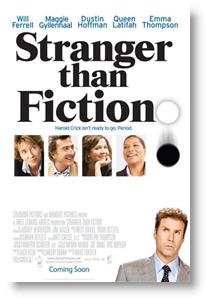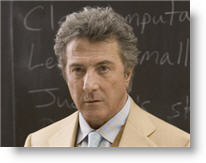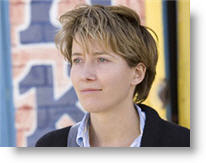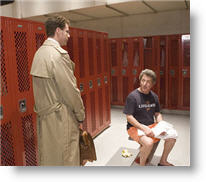Stranger Than Fiction
 for some disturbing images, sexuality, brief language and nudity.
for some disturbing images, sexuality, brief language and nudity.
Reviewed by: Susan Quirk
CONTRIBUTOR
| Moral Rating: | Average |
| Moviemaking Quality: |
|
| Primary Audience: | Adults |
| Genre: | Romance Comedy Drama Fantasy |
| Length: | 1 hr. 53 min. |
| Year of Release: | 2006 |
| USA Release: |
November 10, 2006 |











Suicide, what does the Bible say? Answer
If a Christian commits suicide, will they go to Heaven? Answer
What is true love and how do you know when you have found it? Answer

Learn how to make your love the best it can be. Christian answers to questions about sex, marriage, sexual addictions, and more. Valuable resources for Christian couples, singles and pastors.
| Featuring |
|---|
| Will Ferrell, Maggie Gyllenhaal, Dustin Hoffman, Emma Thompson, Tony Hale, Tom Hulce, Kristin Chenoweth, Queen Latifah |
| Director |
|
Marc Forster |
| Producer |
| Nathan Kahane, Joe Drake, Eric Kopeloff |
| Distributor |
“Harold Crick isn’t ready to go. Period.”
Harold Crick (Will Ferrell) is a man who lives by his wristwatch. In the finite world he has created for himself, his life is separated into well ordered increments of timeslots and activities. He brushes his thirty-six teeth the same number of strokes each morning and walks the same number of steps to catch the same bus to his job as an auditor at the IRS. All is well, until he begins to hear a narrator’s voice (Emma Thompson) in his head who is evidently writing his life as a work of tragic fiction. Harold seeks the advice of a literary professor (Dustin Hoffman) who works to identify the author of the story in an attempt to help Harold regain control over his life and his sanity.
“Little does he know” the author of Harold’s life, Kay Eiffel is a morose writer with an obsession with death. When Harold is clued into the imminence of his death on the page, he determines to fight this death sentence and consequently upsets the repetitive and mundane nature he has imposed on his own life. In his attempt to wrest the narration of his life into his own hands, Harold takes his first vacation, learns how to play the electric guitar, eats his first cookie, and courts the bohemian baker, Ana Pascal (Maggie Gyllenhaal), he meets while auditing her for tax evasion.
As a Christian, there was much to applaud in the messages put forth in “Stranger Than Fiction.” Harold was caught up in the easiest, and most selfish trap in life—to plod along not noticing others for fear of unsettling one’s own routine. Harold learns to look deeply in between the strictly composed lines of his life and realizes this is where unexpected joy is found. He also accepts the conclusion that he wants his life to be a great story, which may mean sacrificing his life for the life of another. Harold realizes his life must intercept the story in other peoples’ lives to truly live.
Viewers need to be warned of some profanity, the delineation of Harold’s lustful thoughts toward Ms. Pascal, Ms. Pascal’s accusation of Harold starring at her breasts, one exclamation of the “F” word, several exclamations of “oh, my god,” and a useless scene in a men’s locker room which results in male rear nudity. Additionally, author, Kay Eiffel’s fantasies about death and suicide are graphically shown on film.
More problematic for the Christian viewer is Harold’s sexual relationship with Ana Pascal, indicated by passionate kissing and waking up in her bed. Harold is obviously not a promiscuous man, and it is unfortunate the writer of this script equated sexual expression outside of marriage as a positive progression of Harold’s enlightenment and empowerment in his life. The scenes illustrating Harold conquering his insecure and self-oriented personality provided the more poignant message of victory in Harold’s life, and the sexual relationship actually deterred from this point.
Harold Crick’s problem was not that he was always keeping his eye on the time, it was that he was spending his time on the wrong things. The wristwatch was not the problem, but actually served as a reminder to spend his precious minutes on the right things. “Stranger Than Fiction” ends with two surprisingly strong messages that are impossible to find fault with. Jesus said in John 15:13 “Greater love has no one than this, that he lay down his life for his friends.” Both Harold Crick and the author of his character, Kay Eiffel are put to this test. In Matthew 16:25, Jesus states: “For whoever wants to save his life will lose it, but whoever loses his life for me will find it. What good will it be for a man if he gains the whole world, yet forfeits his soul?” God longs to send this message to mankind and strangely enough, the secular movie “Stranger Than Fiction” gives us a small glimpse of this beautiful truth.
Violence: Minor / Profanity: Moderate / Sex/Nudity: Moderate
See list of Relevant Issues—questions-and-answers.


Better than Average / 4
The only other objectable thing may be in the relationship area of the film. There is one scene of Harold looking at Ana and the narrator indicates that he is having fantasies about her. However, when the narrator begins speaking as Harold is staring at Ana in the shop, it states that Harold “was not prone” to fantasizing or having lustful thoughts. It is human nature to be attracted to someone though, and the scene was done much more tastefully than most movies would have made it.
To avid readers and people who devour literature, this film will be intriguing. As a student who loves writing, I found myself really connecting with the character of the author in her frenzy to find the perfect conclusion to her book. I don’t see too many movies that I want to recommend to my parents to see, since they get offended much more easily than I do. But I told them to go see it as soon as possible. There are many positive themes and messages, but like any good novel, it’s up to you, the reader/viewer to discover for yourself.
Good / 5
Better than Average / 4
Average / 4
I have to admit, my expectations were high as we are picky about videos (however, last week we watched “GhostRider”… very inconsistent). I expected a storyline to take us beyond the humanist *everything is okay* *we are all living in this world and doing the best we can mentality* to a divine perspective, especially in dealing with the mortality of a man and another being who held his fate. This is where the water became suddenly shallow.
Without giving too much away, the movie gave you nothing in return. It offered little challenge from such a serious matter, and I felt rather betrayed by the notion that all the credit for everything that took place in all their lives went to an insignificant “thing.”
It offered very little in spiritual substance, except a mere mention of God in passing, and could have offered more in the broader aspect of the effect of Harolds life in others. The whole story became all about Harold and his death, when the makers of the film could have deepened the story and made it about others around him, and how Harolds entire life and life change brings about a complete change in those around him, including the 2 main figures directly involved in his accident and death. They glazed the surface of selflessness, but it just didn’t come through. The film was a big disappointment for me. A broader perspective could have delivered a remarkable film, but instead it will line the movie shelves with other *humanist, feel good for 2 hours and nothing more* movies.
Very Offensive / 4½
Offensive / 3½
Better than Average / 4½
Better than Average / 4½
Better than Average / 5
Average / 4½

My Ratings: Average / 4